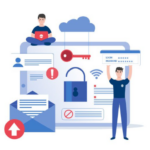Digital accessibility in the hospitality industry benefits guests and businesses alike. By making accessible digital platforms, websites, and services, the industry enhances customer experiences. And also expands its audience, and meets legal requirements.
Digital accessibility in the context of the hospitality industry
The hospitality industry must prioritize making digital platforms and services accessible to individuals with disabilities. It involves designing content and technologies that remove barriers and enable equal access, navigation, and interaction. By prioritizing digital accessibility, hospitality businesses ensure inclusive participation and equal access to information, services, and experiences.
Importance of digital accessibility in the hospitality industry
In the hospitality industry, digital accessibility is crucial for several reasons. It promotes inclusivity by allowing individuals with disabilities to independently access and utilize digital platforms. It helps businesses comply with legal requirements related to equal access to goods and services. Moreover, digital accessibility enhances customer experiences and expands the potential customer base. It also provides a competitive advantage, and fosters a positive brand reputation.
Inclusivity
Inclusion ensures individuals with disabilities can access and utilize digital platforms and services offered by hospitality businesses. It eliminates barriers and provides equal opportunities for all individuals to engage with the industry. Everyone can make reservations, access information, and communicate effectively. By prioritizing accessibility, hospitality businesses promote inclusivity and demonstrate a commitment to serving a diverse range of customers.
Legal Compliance
Many countries have laws and regulations that mandate equal access to goods and services, including digital offerings. For instance, the ADA requires businesses to provide accommodations for individuals with disabilities. By ensuring digital accessibility, hospitality businesses comply with legal requirements, reducing the risk of litigation, penalties, and reputational damage.
Enhanced Customer Experience
Overall customer experience shows improvement after implementing digital accessibility measures. Accessible websites and apps are typically designed with clear navigation, user-friendly interfaces, and well-structured content. These features benefit all users by making it easier to find information, navigate through the platforms, and complete desired tasks. By prioritizing accessibility, hospitality businesses create more engaging and satisfying experiences for their customers.
Expanded Customer Base
Hospitality businesses can expand their audience and reach newer customers around the world by adopting accessibility. With millions of individuals worldwide with disabilities, prioritizing accessible digital platforms enables businesses to attract everyone. This inclusive approach helps tap into a significant consumer segment and gain a competitive advantage over businesses that overlook accessibility.
Positive Brand Image and Reputation
Demonstrating a commitment to digital accessibility contributes to a positive brand image and reputation for hospitality businesses. Inclusive practices and accessible offerings are valued by customers, including those without disabilities, who appreciate companies that prioritize equal access. By prioritizing accessibility, businesses showcase their social responsibility, empathy, and dedication to providing exceptional experiences for all individuals.
Business Differentiation
Hospitality businesses can stand out from their competitors in a highly competitive industry. When individuals with disabilities can access and use digital platforms effortlessly, they prefer establishments that prioritize their needs. By investing in accessibility, businesses stand out, attracting customers who value inclusivity and equal service access.
Impact of Digital Accessibility on the Hospitality Industry
Inclusive Customer Experience
Customers with disabilities can effectively access and use digital platforms in the hospitality industry. Accessible websites and mobile apps facilitate browsing, booking accommodations, making reservations, accessing information, and communication for users with various disabilities. By offering inclusive experiences, hotels and resorts can attract and retain a diverse customer base.
Legal Compliance
Digital accessibility is legally mandated in several countries, such as the United States, Canada, and European Union members. Laws like the ADA in the U.S. demand equal access to goods and services, including digital offerings. By prioritizing digital accessibility, hospitality businesses comply with these laws, mitigating legal risks and potential lawsuits.
Competitive Advantage
By offering an accessible and user-friendly online presence, establishments can differentiate themselves from their competitors. And also attract customers who prioritize inclusivity. Accessible features such as clear navigation can significantly enhance the user experience for all customers, regardless of ability.
Increased Reach and Revenue
By prioritizing digital accessibility, the hospitality industry can tap into a larger market. People with disabilities, their families, friends, and caregivers represent a substantial consumer segment. When digital platforms are designed with accessibility in mind, they become more discoverable, usable, and engaging for this audience. Consequently, accessible websites and apps can increase the visibility, reach, and revenue potential of hospitality businesses.
Positive Brand Reputation
Demonstrating a commitment to accessibility can enhance a hospitality business’s reputation and brand image. Customers, including those without disabilities, appreciate companies that prioritize inclusivity and equal access. By investing in digital accessibility, hospitality businesses demonstrate their commitment to inclusive customer experiences, showcasing their values and social responsibility.
Employee Inclusion
Businesses enable employees with disabilities to contribute effectively, by implementing accessible technology and training Thus fostering a positive work environment that embraces diversity and equal opportunities.
How can digital accessibility improve customer experiences in the hospitality industry?
Businesses can improve customer experiences in hospitality by enabling individuals with disabilities to access and utilize digital platforms seamlessly. It enables easy browsing, booking, reservations, information access, and communication. By incorporating features like clear navigation, businesses create a user-friendly and inclusive experience for all customers.
Accessible Booking and Reservations
Accessibility ensures that individuals with disabilities can easily browse and book accommodations, make reservations, and access availability information. By providing accessible forms and assistive technology compatibility, businesses make the booking process more seamless and user-friendly for all customers.
Inclusive Information Access
Inclusive access allows individuals with disabilities to access and understand essential information about accommodations, amenities, services, and policies. Clear and well-structured content enhance information accessibility for people with visual impairments or reading difficulties.
Assistive Technology Compatibility
Make websites and apps compatible with assistive technologies such as screen readers, screen magnifiers, and alternative input devices. This enables individuals with disabilities to access and navigate digital platforms effectively. This ensuring they can engage with the content and functionalities.
Multimedia Accessibility
Captions, transcripts, and audio descriptions help to make multimedia assets accessible to individuals with hearing or visual impairments. This ensures that all customers can enjoy and comprehend the information and experiences presented through multimedia formats.
Clear Navigation and User Interface
Clear and intuitive navigation ensures users can easily find information and access different sections of the website or app. They can complete their tasks much more efficiently and save time. Well-designed user interfaces with logical structures and consistent layouts improve the user experience for all customers.
Adjustable Display Settings
Adjustable text sizes allows individuals with visual impairments to personalize their experience based on their needs and preferences. This flexibility enhances readability and usability for a wider range of users.
Responsive and Mobile Accessibility
With the increasing use of mobile devices, ensuring that digital platforms are responsive and mobile-accessible is crucial. Accessibility ensures websites and apps adapt to different screen sizes and functionalities. Thus allowing customers to access and interact with them seamlessly across various devices.
Feedback and Support
Provide accessible channels for customers to provide feedback, ask questions, and seek support. Accessible contact forms and customer support options ensure customer needs are promptly addressed. Alternative communication methods (such as text-based chat) enable individuals with disabilities to engage with businesses more effectively.
Conclusion
Digital accessibility in the hospitality industry enables equal access to information and services for all individuals. By prioritizing accessibility, hotels and other hospitality businesses can provide a seamless and inclusive experience for guests with disabilities.
By embracing digital inclusivity, hospitality businesses can demonstrate their commitment to provide exceptional service to all guests. Thus fostering a welcoming and inclusive environment for everyone.









